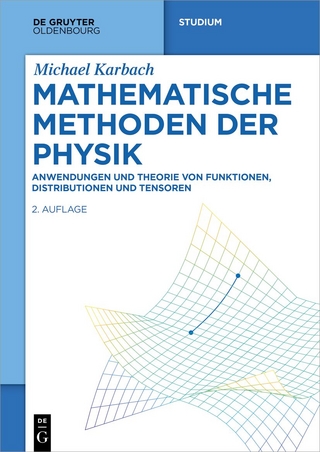
Chi-Squared Data Analysis and Model Testing for Beginners
Oxford University Press (Verlag)
978-0-19-884714-4 (ISBN)
Recent groundbreaking discoveries in physics, including the discovery of the Higgs Boson and gravitational waves, have relied on chi-squared analysis and model testing, a data analysis method. This is the first book to make chi-squared model testing accessible to students in introductory physics lab courses and others who need to learn this method, such as beginning researchers in astrophysics and particle physics, beginners in data science, and lab students in other experimental sciences. For over a decade, Harvard University's introductory physics lab sequence has made chi-squared model testing its central theme. Written by two faculty members, the book is based on years of experience teaching students learn how to think like scientists by testing their models using chi-squared analysis.
By including uncertainties in the curve fitting technique, chi-squared data analysis improves on the centuries old ordinary least squares and linear regression methods and combines best fit parameter estimation and model testing in one method. A toolkit of essential statistical and experimental concepts is developed from the ground up with novel features to interest even those familiar with the material. The presentation of one and two parameter chi-squared model testing, requiring only elementary probability and algebra, is followed by case studies that apply the methods to simple introductory physics lab experiments. More challenging topics requiring calculus are addressed in an advanced topic chapter.
This self-contained and student-friendly introduction includes a glossary, end of chapter problems with complete solutions, and software scripts available in several popular programming languages that the reader can use for chi-squared model testing.
Carey Witkov, PhD, is a preceptor in physics at Harvard University with over 40 years of undergraduate physics teaching experience. He teaches Harvard University's innovative Principles of Scientific Inquiry (PSI) introductory physics lab courses within which freshman and sophomore students learn chi-squared analysis and model testing. His favorite physics lab experiments are those that involve simple equipment but sophisticated analysis. Keith Zengel received his PhD in experimental particle physics from Brandeis University in 2015. He worked on the ATLAS experiment at the Large Hadron Collider, searching for supersymmetric and exotic particles and writing software for the endcap muon spectrometer. Since then he has worked as a Preceptor in Physics at Harvard University. His current research interests are introductory and intermediate classical mechanics, electrodynamics, and data analysis.
1: Introduction
2: Statistical Toolkit
3: One Parameter Chi-squared Analysis
4: Two Parameter Chi-Squared Analysis
5: Case Study 1: Falling Chains
6: Case Study 2: Modeling Air Resistance on Falling Coffee Filters
7: Advanced Topics
| Erscheinungsdatum | 20.11.2019 |
|---|---|
| Zusatzinfo | 33 grayscale line figures |
| Verlagsort | Oxford |
| Sprache | englisch |
| Maße | 162 x 235 mm |
| Gewicht | 334 g |
| Themenwelt | Mathematik / Informatik ► Mathematik ► Angewandte Mathematik |
| Naturwissenschaften ► Physik / Astronomie ► Thermodynamik | |
| ISBN-10 | 0-19-884714-9 / 0198847149 |
| ISBN-13 | 978-0-19-884714-4 / 9780198847144 |
| Zustand | Neuware |
| Haben Sie eine Frage zum Produkt? |
aus dem Bereich


